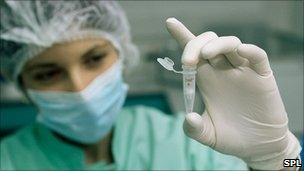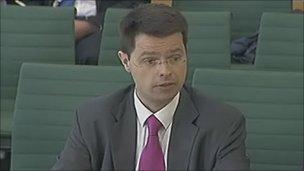Science advice 'not sought' on forensics closure
- Published

The government wants the private sector to fill the gap left by the FSS
The Home Office's chief scientific adviser was not consulted over the closure of the UK Forensic Science Service (FSS), it has emerged.
Bernard Silverman said he was informed in advance but not consulted "as such".
Dr Silverman was speaking at a hearing in the House of Commons Science and Technology Committee's inquiry into the closure of the FSS.
But he said that he viewed the process as acceptable because it had been taken on legal and commercial grounds.
The government announced last year that the FSS would close, with as many of its operations as possible being transferred or sold off.
Experts have been critical of the decision, saying it could harm the UK's position as a leader in forensic science.
The service analyses evidence from crime scenes in England and Wales, but has been losing about £2m a month. The FSS is a 100% government-owned company, which is expected to compete in the forensic marketplace.
Asked by the committee's chair, Labour MP Andrew Miller, whether he had been consulted, Dr Silverman replied: "I was informed and so was [the government's chief scientific adviser] John Beddington… but we weren't consulted, as such, in advance of the decision being made.
"We were informed so that when the decision was [announced] we were tipped off in advance.
"My understanding at the time, and now, is that the decision was made on legal and commercial grounds. It isn't within the chief scientific adviser's remit to advise on those matters. Therefore, I didn't see the process as unreasonable."
In response to the same question, the UK Forensic Science Regulator, Andrew Rennison, commented: "I was aware, a couple of weeks beforehand, but was not consulted. But I am being consulted now."
Three options
Speaking at the hearing, Crime Reduction Minister James Brokenshire MP said the government had been presented with a "difficult" situation, repeating a previous disclosure that the FSS was projected to have run out of money by early 2011.

Mr Brokenshire said he would consider statutory powers for the forensic regulator
He said the decision to wind down the FSS was "largely commercially driven, but with the clear recognition of the impact and the overall role the FSS plays in forensics and the role that it plays for the police."
Asked by Mr Miller what options had been considered prior to taking the decision, Mr Brokenshire replied that three possible courses of action had been discussed - including the eventual choice of closure.
The first of these options - allowing the FSS to go into an unmanaged administration - had been discounted because of what Mr Brokenshire said was "our fundamental desire to ensure there was integrity in the criminal justice system".
The minister said that some form of restructuring - to enable the FSS to break even in future - had also been considered.
But this option had been rejected because of projections showing a shrinking forensic market and also past financial outcomes when the FSS had tendered for commercial work in the past.
The government wants private enterprise, which currently makes up 40% of the market, to fill the gap left behind by the FSS.
But some experts are concerned that an over-emphasis on profits could threaten the quality of science.
Additional powers?
Mr Brokenshire has previously said that the Forensic Science Regulator should ensure that quality standards are maintained. This course is questioned by the Prospect union, which represents scientists and engineers, in their written evidence to the inquiry.
"Currently the forensic science regulator sits in the Home Office, but... Prospect understands that there are very limited powers and no statutory influence," the union wrote.
"Additional regulatory powers will be needed to ensure that there is a level playing field between police forces and private contractors. It will also be essential to ensure that forensic science practitioners have recognisable and respected qualifications and a professional code of ethics."
Asked whether it was time to give the Forensic Science Regulator statutory powers, Mr Brokenshire said: "It is something I am certainly willing to consider… if Mr Rennison feels he is coming up with issues in terms of his ability to deliver on standards and quality and giving the assurance that we want him to."
Dr Silverman is conducting a review into the future of UK forensic research and development (R&D), which is set to conclude shortly.
Asked whether the UK's international standing in forensic research would be affected by the winding down of the service, Mr Rennison responded: "I think it will be dented."
But he added that commercial forensic providers were carrying out "very good research".
He also commented: "My view is that [the FSS] don't leave a vacuum behind them. There are a lot of people around the world doing equally good work that is held in equally high regard."
- Published11 March 2011
- Published2 March 2011
- Published25 February 2011
- Published19 January 2011